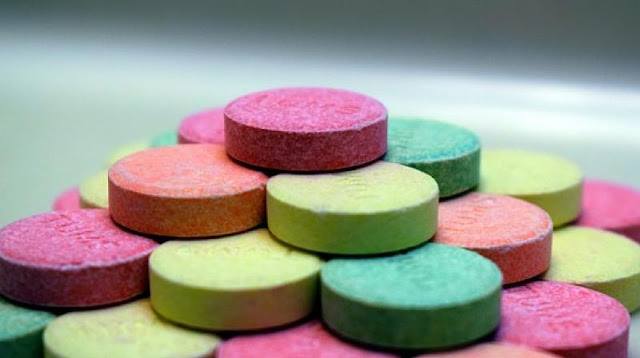SCABIES scabies Scabies is a contagious skin infestation caused by the human itch mite known as the Sarcoptes scabiei characterized by intensive itching and rashes. Female microscopic eight legged mites burrow into upper layer of skin where they live and lay eggs (three or less) per day. The infestation is transmitted from one person to another host through intimate contact (crowded area, poor hygiene, and sexual contact), sharing contaminated clothing, towel and bedding. Sites for outbreak of scabies includes school, hospital, nursing homes, prison and other extended care institution. Effective recommended treatment of scabies involves entire group of people who are at risk of develop scabies in the infected area. SYMPTOMS AND SIGNS OF SCABIES. It takes up to six weeks for signs and symptoms of scabies to manifest for new infected person but for those who had infection before symptoms will appear quickly. The diagnostic symptoms of scabies infestation is d...
TREATMENT OF PEPTIC ULCERS.
Treatment of peptic ulcers depend greatly on the underlying cause of the Ulcers and clinical presentation. Usually treatment involves cessation or reduction of NSAIDs use by substitute them with other pain medications, promote Ulcers healing, neutralize/reduction of Stomach Acid and eradication of H. pylori Bacterium. Here I will discuss basic and most common medications to treat peptic Ulcers.
 |
- Acid Neutralizing Drugs (Antacids).
Neutralization of secreted Stomach Acid with Antacids constituted the main form of therapy for Peptic Ulcers and Indigestion. The most common Antacids are Aluminium hydroxide and Magnesium hydroxide and they available as tablets or syrup. Antacid can provide relief of the symptoms and not Ulcers heal.
 |
| Antacid neutralize secreted stomach acid |
- Medications that inhibit or reduce Acid secretion/production known as H-2 Receptor Antagonists.
These includes Cimetidine 400 mg, Ranitidine 300 mg, Famotidine 40 mg, and Nizatidine 300 mg.
NB: (For dose prescription of these Drugs please see your Doctor).
Presently this class of drugs is often used for treatment of active Ulcers and in combination of Antibiotics directed at eradicating Helicobacter pylori.
NB: (For dose prescription of these Drugs please see your Doctor).
Presently this class of drugs is often used for treatment of active Ulcers and in combination of Antibiotics directed at eradicating Helicobacter pylori.
- Medications that promote healing and block production of acid secretion known as Proton Pump Inhibitors (PPI).
These Drugs Includes Omeprazole 20 mg, Lansoprazole 30 mg, Rabeprazole 20 mg, Pantoprazole 40 mg, Esomeprazole 20 mg.
NB: (For dose prescription of these Drugs please see your Doctor).
Proton Pump Inhibitors reduce Stomach acids by Blocking the action of the parts of Cells that secrete Stomach acid. Also in combination of Antibiotics directed at eradicating Helicobacter pylori and promote healing of the active Ulcers.
NB: (For dose prescription of these Drugs please see your Doctor).
Proton Pump Inhibitors reduce Stomach acids by Blocking the action of the parts of Cells that secrete Stomach acid. Also in combination of Antibiotics directed at eradicating Helicobacter pylori and promote healing of the active Ulcers.
- Medications that protect mucosal lining of the Stomach and Small Intestine.
These Drugs includes Sucralfate 1 g, Misoprostol 200 mcg, Bismuth subsalicylate (BSS) 2 tablets. Helps in protecting tissue that lining the Stomach and Intestine from Stomach acid and Infection of Helicobacter pylori.
TREATMENT OF HELICOBACTER PYLORI (H. PYLORI).
Therapy of H. pylori infection consist of 10 days to 14 days of one or more effective antibiotics such as Tetracycline, Amoxicillin (not of the children under 12 years), other are Metronidazole, Clarithromycin, plus either Proton Pump Inhibitors or H-2 Blocker agents.
 |
| H. Pylori |
Regime recommended for eradication of Helicobacter Pylori infection are as follows;
Triple Therapy - Involves combination of tree drugs.
- Omeprazole 20 mg or (Lansoprazole 30 mg) plus Clarithromycin 250 or 500 mg plus Metronidazole 500 mg or (Amoxicillin 1 g).
- Ranitidine bismuth citrate 400mg plus Tetracycline 500 mg plus Clarithromycin 500 mg or (Amoxicillin 500 mg).
- Bismuth subsalicylate 2 tablets plus Metronidazole 250 mg plus Tetracycline 500 mg.
Quadruple Therapy - Involves combination of four drugs
- Omeprazole 20 mg or (Lansoprazole 30 mg) plus bismuth subsalicylate 2 tablets plus Metronidazole 250 mg plus Amoxicillin 500 mg
NB: (For dose prescription of above medications please see your Doctor)
FOLLOW UP AFTER INITIAL THERAPY.
Treatment for peptic ulcers is often successful, leading to ulcer healing. But if the symptoms are continue and severe despite treatment, may endoscopy be recommended to rule out other possible causes for your symptoms.
 |
| Limit NSAID use |
HOW TO PREVENT PEPTIC ULCERS
Certain lifestyle choices and habits can reduce your risk of developing peptic ulcers. These include:
- not drinking more than two alcoholic beverages a day
- not mixing alcohol with medication
- washing your hands frequently to avoid infections
- limiting your use of ibuprofen, aspirin
Maintaining a healthy lifestyle by quitting smoking cigarettes and other tobacco use and eating a balanced diet rich in fruits, vegetables, and whole grains will help you prevent developing a peptic ulcer.
 |
| say NO to alcohol and cigarette stay health. |


Comments
Post a Comment